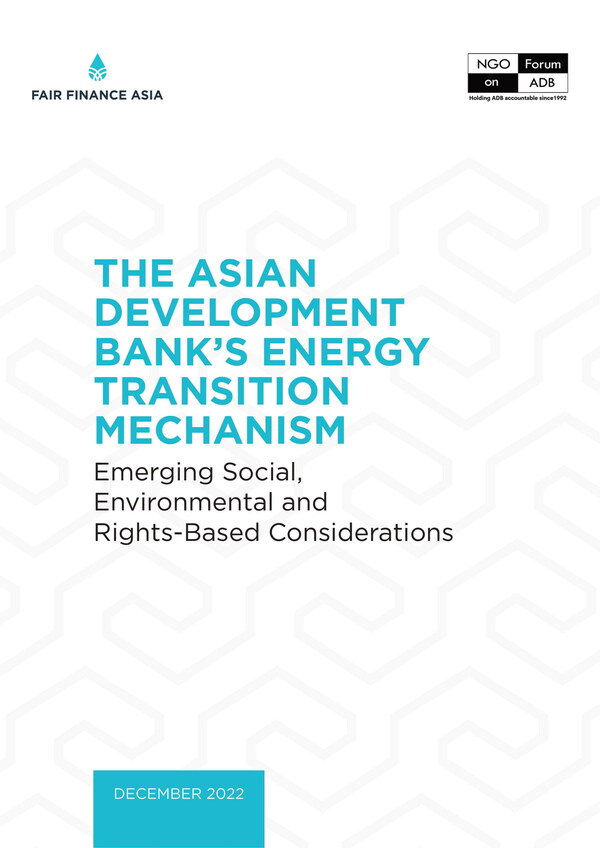PHNOM PENH, Cambodia and MANILA, Philippines , Jan. 26, 2023 /PRNewswire/ -- Fair Finance Asia (FFA) and NGO Forum on ADB (the Forum) have released a new report, "The Asian Development Bank's Energy Transition Mechanism: Emerging Social, Environmental and Rights-Based Considerations." The report raises critical questions and concerns about the Energy Transition Mechanism (ETM), which is being advanced by the Asian Development Bank (ADB) as a market-oriented solution to accelerate the process of taking coal power off of national energy grids in specific Southeast, South and Central Asian countries and replacing it with other sources of power.

FFA and NGO Forum on ADB (December 2022). The Asian Development Bank’s Energy Transition Mechanism: Emerging Social, Environmental and Rights-Based Considerations.
FFA and the Forum developed this report to serve as a source of key information for groups monitoring how the ETM is being operationalized, as well as for communities living around, and working at, coal project sites selected for ETM implementation. As ADB advances plans to pilot the ETM in Indonesia, Philippines, Pakistan, and later in Kazakhstan and Vietnam, the report reiterates key risks and concerns being raised by civil society, community, and workers' organizations about the design and proposed implementation of the ETM.
As explained by Mr. Rayyan Hassan, Executive Director, NGO Forum on ADB, "By keeping a close watch on the development of the ADB's ETM since it was announced in 2021, civil society groups in the region are becoming increasingly concerned that the ETM is flawed by design, seemingly leaving communities and workers at the very sites where the ETM will be proposed to be piloted in the dark, as the terms and conditions of early power plant retirement are negotiated under non-disclosure agreements, while turning a blind eye to the demands by broad social movements across the region for publicly accountable processes to phase out coal and other fossil fuel industries without delay."
In particular, FFA and the Forum's new report highlights that, to date, the ETM:
"Just energy transition is not as simple as shifting from fossil fuels to less carbon-intensive sources of energy," said Ms. Bernadette Victorio, Program Lead, Fair Finance Asia. "The 'just' element must be reflected in the quality and pace at which the transition happens. Are the rights of communities, workers, and indigenous peoples respected and safeguarded? Are there broad, inclusive, democratic, and transparent consultative processes happening between key stakeholders? Are we ensuring that this whole process is not lopsidedly benefitting fossil fuel companies and their investors? These are only some of the very basic elements that need to be considered in the ADB's ETM rollout process. Our latest study details other key recommendations, and we share them during this critical juncture as the ETM's pilot project is being discussed."
The report also provides a set of initial recommendations in cases where the ADB and ETM implementing partners, such as the WBG, have been involved in supporting the coal sector and industries. Accordingly, Mr. Hassan added, "Finally, after decades of bankrolling coal power projects in the region, the ADB committed to stop financing new coal power projects in 2021. Yet, the ADB consistently fails to meaningfully address the demands for justice and accountability raised by communities whose health and livelihoods have been ravaged by the ADB's investments in coal-related infrastructure, including in the Philippines, Pakistan and Mongolia. How many more years must they wait?"
"There's a real opportunity for the ADB's ETM to support Asia's transition away from fossil fuels, but until the critical questions and gaps around socio-environmental safeguards are appropriately addressed, then this seems like another business-as-usual deal for fossil fuel companies and their investors," said Ms. Victorio.
To access the full report, click here.
For more information, contact:
Kyle Cruz
Communications Coordinator, Fair Finance Asia
Tanya Lee-Roberts Davis
Energy Policy and Campaigns Strategist, NGO Forum on ADB
About FFA
Fair Finance Asia (FFA) is a regional network of Asian CSOs committed to ensuring that financial institutions' funding decisions in the region respect the social and environmental well-being of local communities.
For more information about FFA, visit https://fairfinanceasia.org/
About NGO Forum on ADB
The NGO Forum on ADB (the Forum) is a network of civil society organizations (CSOs) that has been monitoring the projects, programs, and policies of the Asian Development Bank (ADB) and the Asian Infrastructure Investment Bank (AIIB).
For more information about the Forum, visit https://www.forum-adb.org/